MBA 5316 Assignment 3: Ethical Considerations in Leadership
VerifiedAdded on 2022/10/14
|7
|1197
|12
Homework Assignment
AI Summary
This assignment for MBA 5316 explores the dynamic nature of ethics, providing an example of how ethical standards evolve over time. It identifies and describes four key sources that contribute to the formation of business ethics, differentiating between stockholders and stakeholders. The assignment then outlines four ethical rules for managers to analyze the impact of their decisions on stakeholders, emphasizing the importance of honesty, integrity, loyalty, and trustworthiness. It highlights the role of norms and values in fostering a socially responsible organizational culture and examines the approaches organizations take toward social responsibility. Furthermore, the assignment discusses managerial strategies for encouraging ethical behavior among employees, and it contrasts stakeholder theory with the traditional view of a corporation. Finally, it includes insights from a legal professional and a manager on their respective ethical codes and guidelines for decision-making.
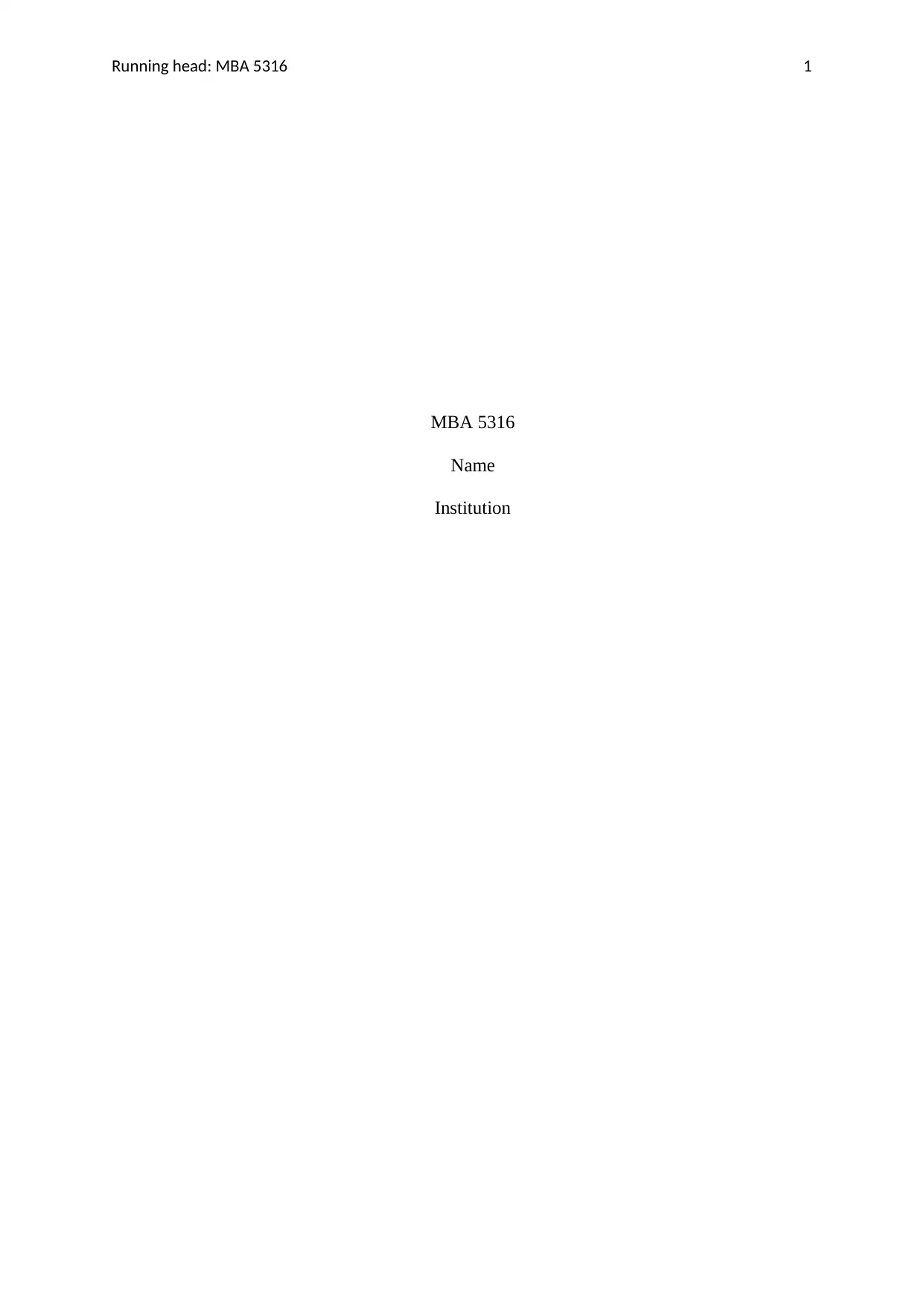
Running head: MBA 5316 1
MBA 5316
Name
Institution
MBA 5316
Name
Institution
Paraphrase This Document
Need a fresh take? Get an instant paraphrase of this document with our AI Paraphraser
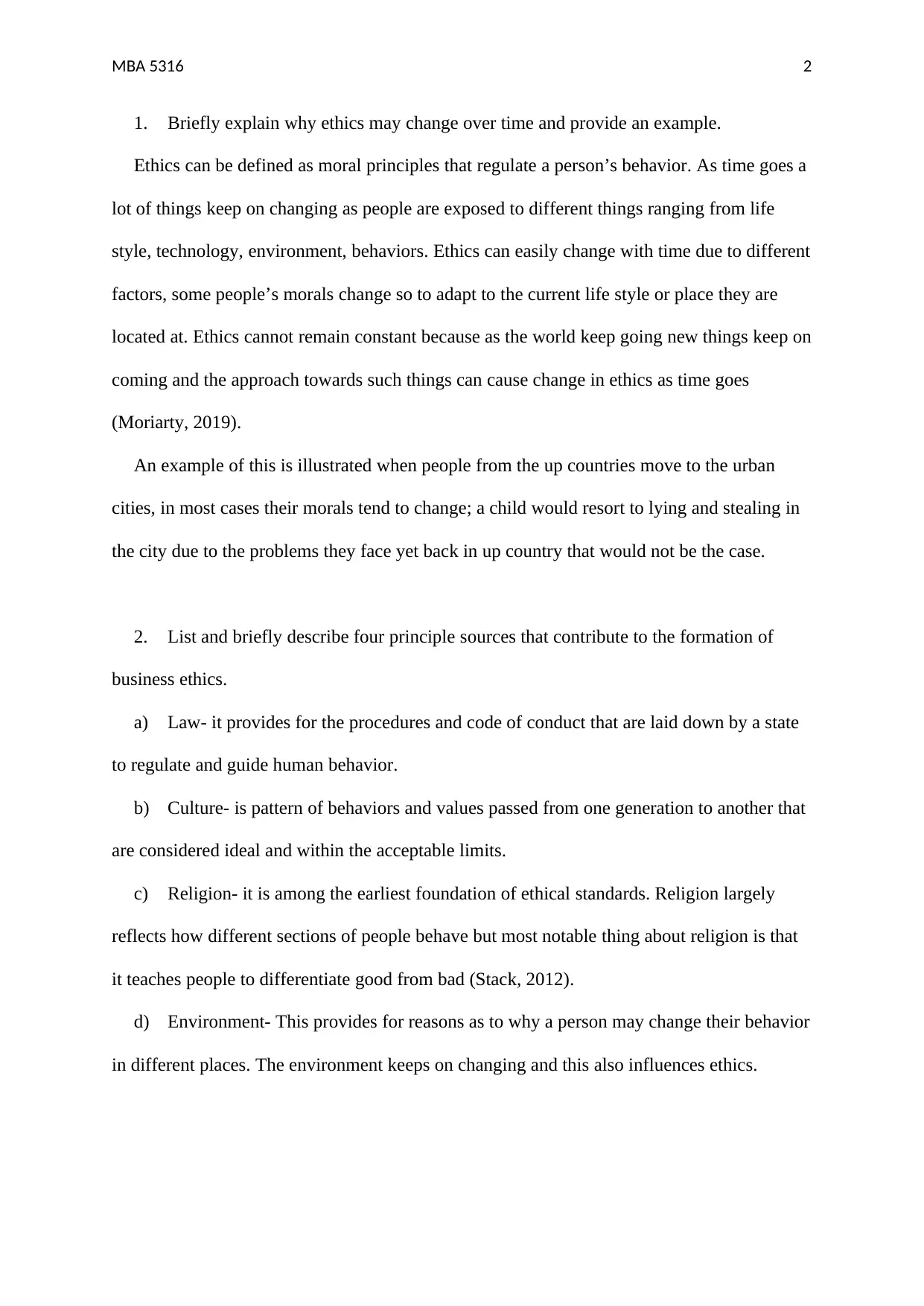
MBA 5316 2
1. Briefly explain why ethics may change over time and provide an example.
Ethics can be defined as moral principles that regulate a person’s behavior. As time goes a
lot of things keep on changing as people are exposed to different things ranging from life
style, technology, environment, behaviors. Ethics can easily change with time due to different
factors, some people’s morals change so to adapt to the current life style or place they are
located at. Ethics cannot remain constant because as the world keep going new things keep on
coming and the approach towards such things can cause change in ethics as time goes
(Moriarty, 2019).
An example of this is illustrated when people from the up countries move to the urban
cities, in most cases their morals tend to change; a child would resort to lying and stealing in
the city due to the problems they face yet back in up country that would not be the case.
2. List and briefly describe four principle sources that contribute to the formation of
business ethics.
a) Law- it provides for the procedures and code of conduct that are laid down by a state
to regulate and guide human behavior.
b) Culture- is pattern of behaviors and values passed from one generation to another that
are considered ideal and within the acceptable limits.
c) Religion- it is among the earliest foundation of ethical standards. Religion largely
reflects how different sections of people behave but most notable thing about religion is that
it teaches people to differentiate good from bad (Stack, 2012).
d) Environment- This provides for reasons as to why a person may change their behavior
in different places. The environment keeps on changing and this also influences ethics.
1. Briefly explain why ethics may change over time and provide an example.
Ethics can be defined as moral principles that regulate a person’s behavior. As time goes a
lot of things keep on changing as people are exposed to different things ranging from life
style, technology, environment, behaviors. Ethics can easily change with time due to different
factors, some people’s morals change so to adapt to the current life style or place they are
located at. Ethics cannot remain constant because as the world keep going new things keep on
coming and the approach towards such things can cause change in ethics as time goes
(Moriarty, 2019).
An example of this is illustrated when people from the up countries move to the urban
cities, in most cases their morals tend to change; a child would resort to lying and stealing in
the city due to the problems they face yet back in up country that would not be the case.
2. List and briefly describe four principle sources that contribute to the formation of
business ethics.
a) Law- it provides for the procedures and code of conduct that are laid down by a state
to regulate and guide human behavior.
b) Culture- is pattern of behaviors and values passed from one generation to another that
are considered ideal and within the acceptable limits.
c) Religion- it is among the earliest foundation of ethical standards. Religion largely
reflects how different sections of people behave but most notable thing about religion is that
it teaches people to differentiate good from bad (Stack, 2012).
d) Environment- This provides for reasons as to why a person may change their behavior
in different places. The environment keeps on changing and this also influences ethics.
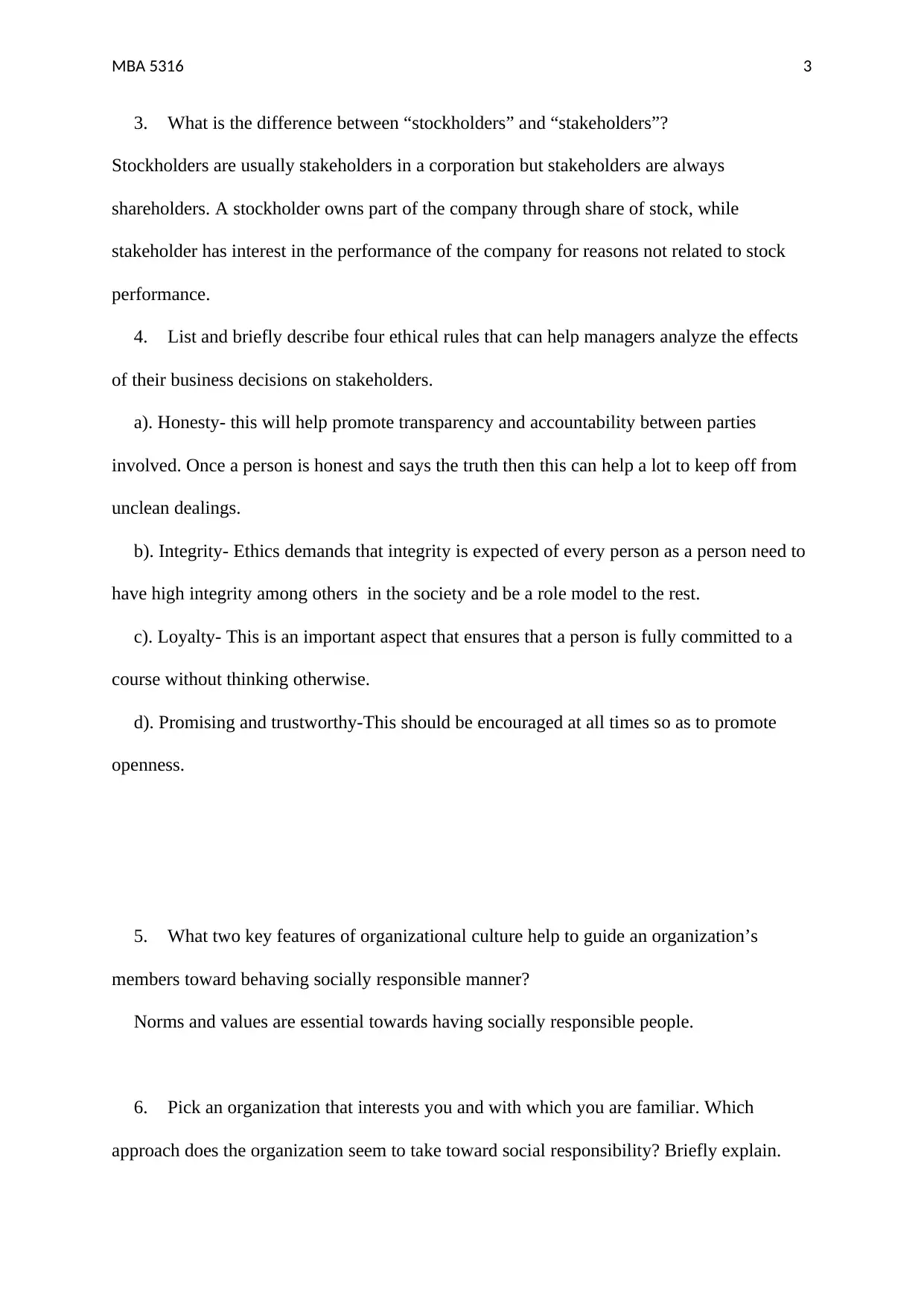
MBA 5316 3
3. What is the difference between “stockholders” and “stakeholders”?
Stockholders are usually stakeholders in a corporation but stakeholders are always
shareholders. A stockholder owns part of the company through share of stock, while
stakeholder has interest in the performance of the company for reasons not related to stock
performance.
4. List and briefly describe four ethical rules that can help managers analyze the effects
of their business decisions on stakeholders.
a). Honesty- this will help promote transparency and accountability between parties
involved. Once a person is honest and says the truth then this can help a lot to keep off from
unclean dealings.
b). Integrity- Ethics demands that integrity is expected of every person as a person need to
have high integrity among others in the society and be a role model to the rest.
c). Loyalty- This is an important aspect that ensures that a person is fully committed to a
course without thinking otherwise.
d). Promising and trustworthy-This should be encouraged at all times so as to promote
openness.
5. What two key features of organizational culture help to guide an organization’s
members toward behaving socially responsible manner?
Norms and values are essential towards having socially responsible people.
6. Pick an organization that interests you and with which you are familiar. Which
approach does the organization seem to take toward social responsibility? Briefly explain.
3. What is the difference between “stockholders” and “stakeholders”?
Stockholders are usually stakeholders in a corporation but stakeholders are always
shareholders. A stockholder owns part of the company through share of stock, while
stakeholder has interest in the performance of the company for reasons not related to stock
performance.
4. List and briefly describe four ethical rules that can help managers analyze the effects
of their business decisions on stakeholders.
a). Honesty- this will help promote transparency and accountability between parties
involved. Once a person is honest and says the truth then this can help a lot to keep off from
unclean dealings.
b). Integrity- Ethics demands that integrity is expected of every person as a person need to
have high integrity among others in the society and be a role model to the rest.
c). Loyalty- This is an important aspect that ensures that a person is fully committed to a
course without thinking otherwise.
d). Promising and trustworthy-This should be encouraged at all times so as to promote
openness.
5. What two key features of organizational culture help to guide an organization’s
members toward behaving socially responsible manner?
Norms and values are essential towards having socially responsible people.
6. Pick an organization that interests you and with which you are familiar. Which
approach does the organization seem to take toward social responsibility? Briefly explain.
⊘ This is a preview!⊘
Do you want full access?
Subscribe today to unlock all pages.

Trusted by 1+ million students worldwide
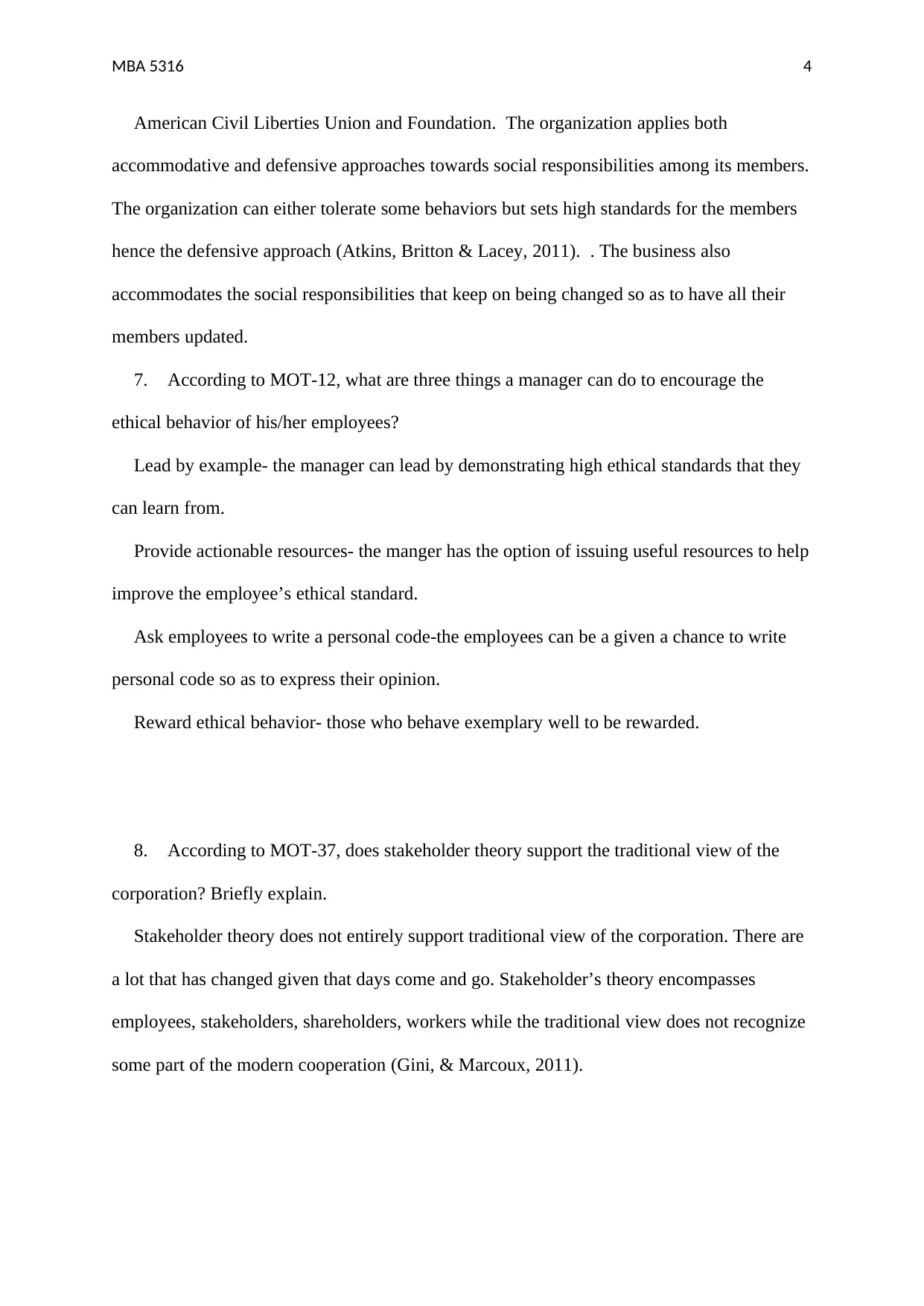
MBA 5316 4
American Civil Liberties Union and Foundation. The organization applies both
accommodative and defensive approaches towards social responsibilities among its members.
The organization can either tolerate some behaviors but sets high standards for the members
hence the defensive approach (Atkins, Britton & Lacey, 2011). . The business also
accommodates the social responsibilities that keep on being changed so as to have all their
members updated.
7. According to MOT-12, what are three things a manager can do to encourage the
ethical behavior of his/her employees?
Lead by example- the manager can lead by demonstrating high ethical standards that they
can learn from.
Provide actionable resources- the manger has the option of issuing useful resources to help
improve the employee’s ethical standard.
Ask employees to write a personal code-the employees can be a given a chance to write
personal code so as to express their opinion.
Reward ethical behavior- those who behave exemplary well to be rewarded.
8. According to MOT-37, does stakeholder theory support the traditional view of the
corporation? Briefly explain.
Stakeholder theory does not entirely support traditional view of the corporation. There are
a lot that has changed given that days come and go. Stakeholder’s theory encompasses
employees, stakeholders, shareholders, workers while the traditional view does not recognize
some part of the modern cooperation (Gini, & Marcoux, 2011).
American Civil Liberties Union and Foundation. The organization applies both
accommodative and defensive approaches towards social responsibilities among its members.
The organization can either tolerate some behaviors but sets high standards for the members
hence the defensive approach (Atkins, Britton & Lacey, 2011). . The business also
accommodates the social responsibilities that keep on being changed so as to have all their
members updated.
7. According to MOT-12, what are three things a manager can do to encourage the
ethical behavior of his/her employees?
Lead by example- the manager can lead by demonstrating high ethical standards that they
can learn from.
Provide actionable resources- the manger has the option of issuing useful resources to help
improve the employee’s ethical standard.
Ask employees to write a personal code-the employees can be a given a chance to write
personal code so as to express their opinion.
Reward ethical behavior- those who behave exemplary well to be rewarded.
8. According to MOT-37, does stakeholder theory support the traditional view of the
corporation? Briefly explain.
Stakeholder theory does not entirely support traditional view of the corporation. There are
a lot that has changed given that days come and go. Stakeholder’s theory encompasses
employees, stakeholders, shareholders, workers while the traditional view does not recognize
some part of the modern cooperation (Gini, & Marcoux, 2011).
Paraphrase This Document
Need a fresh take? Get an instant paraphrase of this document with our AI Paraphraser
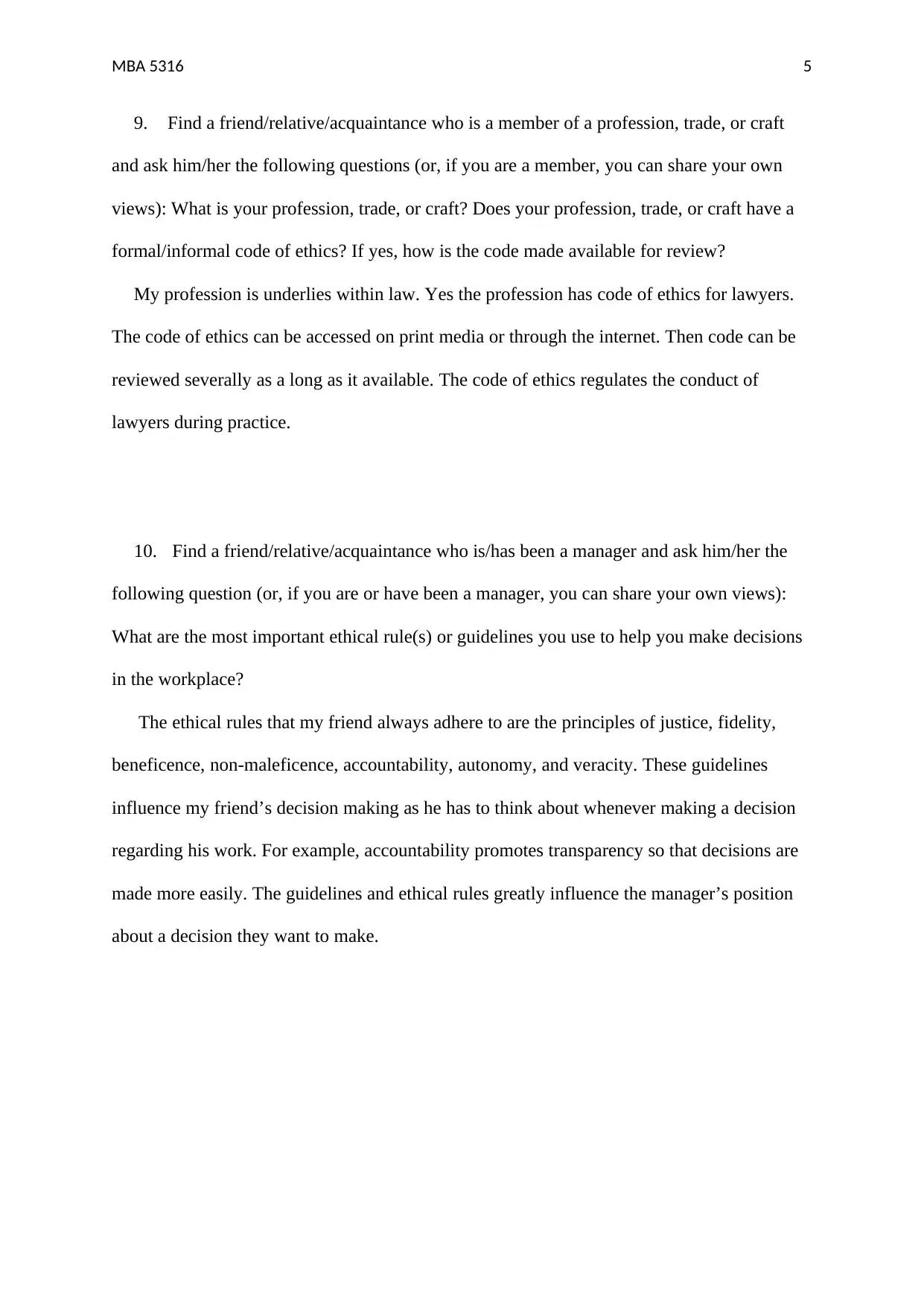
MBA 5316 5
9. Find a friend/relative/acquaintance who is a member of a profession, trade, or craft
and ask him/her the following questions (or, if you are a member, you can share your own
views): What is your profession, trade, or craft? Does your profession, trade, or craft have a
formal/informal code of ethics? If yes, how is the code made available for review?
My profession is underlies within law. Yes the profession has code of ethics for lawyers.
The code of ethics can be accessed on print media or through the internet. Then code can be
reviewed severally as a long as it available. The code of ethics regulates the conduct of
lawyers during practice.
10. Find a friend/relative/acquaintance who is/has been a manager and ask him/her the
following question (or, if you are or have been a manager, you can share your own views):
What are the most important ethical rule(s) or guidelines you use to help you make decisions
in the workplace?
The ethical rules that my friend always adhere to are the principles of justice, fidelity,
beneficence, non-maleficence, accountability, autonomy, and veracity. These guidelines
influence my friend’s decision making as he has to think about whenever making a decision
regarding his work. For example, accountability promotes transparency so that decisions are
made more easily. The guidelines and ethical rules greatly influence the manager’s position
about a decision they want to make.
9. Find a friend/relative/acquaintance who is a member of a profession, trade, or craft
and ask him/her the following questions (or, if you are a member, you can share your own
views): What is your profession, trade, or craft? Does your profession, trade, or craft have a
formal/informal code of ethics? If yes, how is the code made available for review?
My profession is underlies within law. Yes the profession has code of ethics for lawyers.
The code of ethics can be accessed on print media or through the internet. Then code can be
reviewed severally as a long as it available. The code of ethics regulates the conduct of
lawyers during practice.
10. Find a friend/relative/acquaintance who is/has been a manager and ask him/her the
following question (or, if you are or have been a manager, you can share your own views):
What are the most important ethical rule(s) or guidelines you use to help you make decisions
in the workplace?
The ethical rules that my friend always adhere to are the principles of justice, fidelity,
beneficence, non-maleficence, accountability, autonomy, and veracity. These guidelines
influence my friend’s decision making as he has to think about whenever making a decision
regarding his work. For example, accountability promotes transparency so that decisions are
made more easily. The guidelines and ethical rules greatly influence the manager’s position
about a decision they want to make.

MBA 5316 6
References
References
⊘ This is a preview!⊘
Do you want full access?
Subscribe today to unlock all pages.

Trusted by 1+ million students worldwide
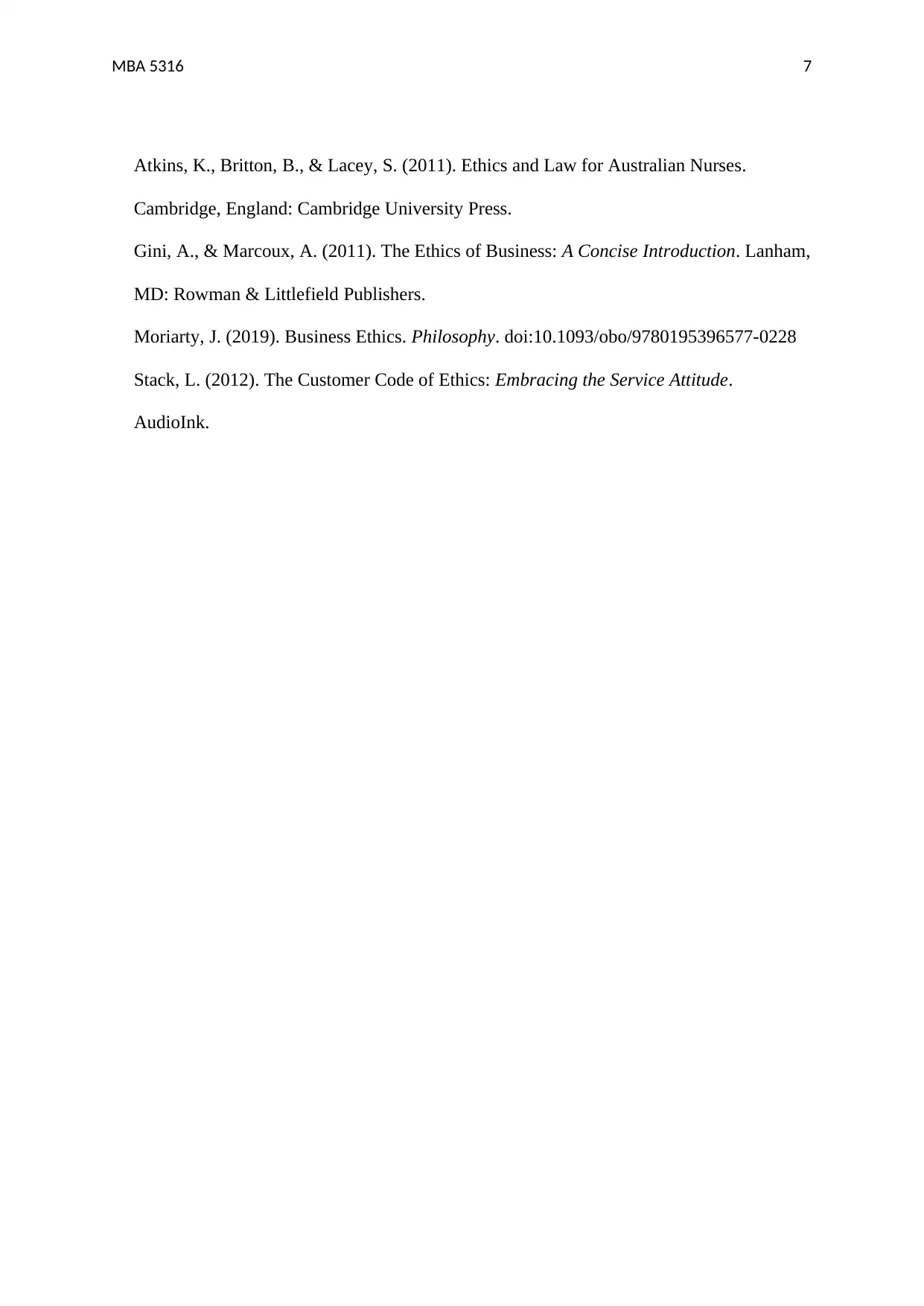
MBA 5316 7
Atkins, K., Britton, B., & Lacey, S. (2011). Ethics and Law for Australian Nurses.
Cambridge, England: Cambridge University Press.
Gini, A., & Marcoux, A. (2011). The Ethics of Business: A Concise Introduction. Lanham,
MD: Rowman & Littlefield Publishers.
Moriarty, J. (2019). Business Ethics. Philosophy. doi:10.1093/obo/9780195396577-0228
Stack, L. (2012). The Customer Code of Ethics: Embracing the Service Attitude.
AudioInk.
Atkins, K., Britton, B., & Lacey, S. (2011). Ethics and Law for Australian Nurses.
Cambridge, England: Cambridge University Press.
Gini, A., & Marcoux, A. (2011). The Ethics of Business: A Concise Introduction. Lanham,
MD: Rowman & Littlefield Publishers.
Moriarty, J. (2019). Business Ethics. Philosophy. doi:10.1093/obo/9780195396577-0228
Stack, L. (2012). The Customer Code of Ethics: Embracing the Service Attitude.
AudioInk.
1 out of 7
Related Documents
Your All-in-One AI-Powered Toolkit for Academic Success.
+13062052269
info@desklib.com
Available 24*7 on WhatsApp / Email
![[object Object]](/_next/static/media/star-bottom.7253800d.svg)
Unlock your academic potential
Copyright © 2020–2026 A2Z Services. All Rights Reserved. Developed and managed by ZUCOL.




